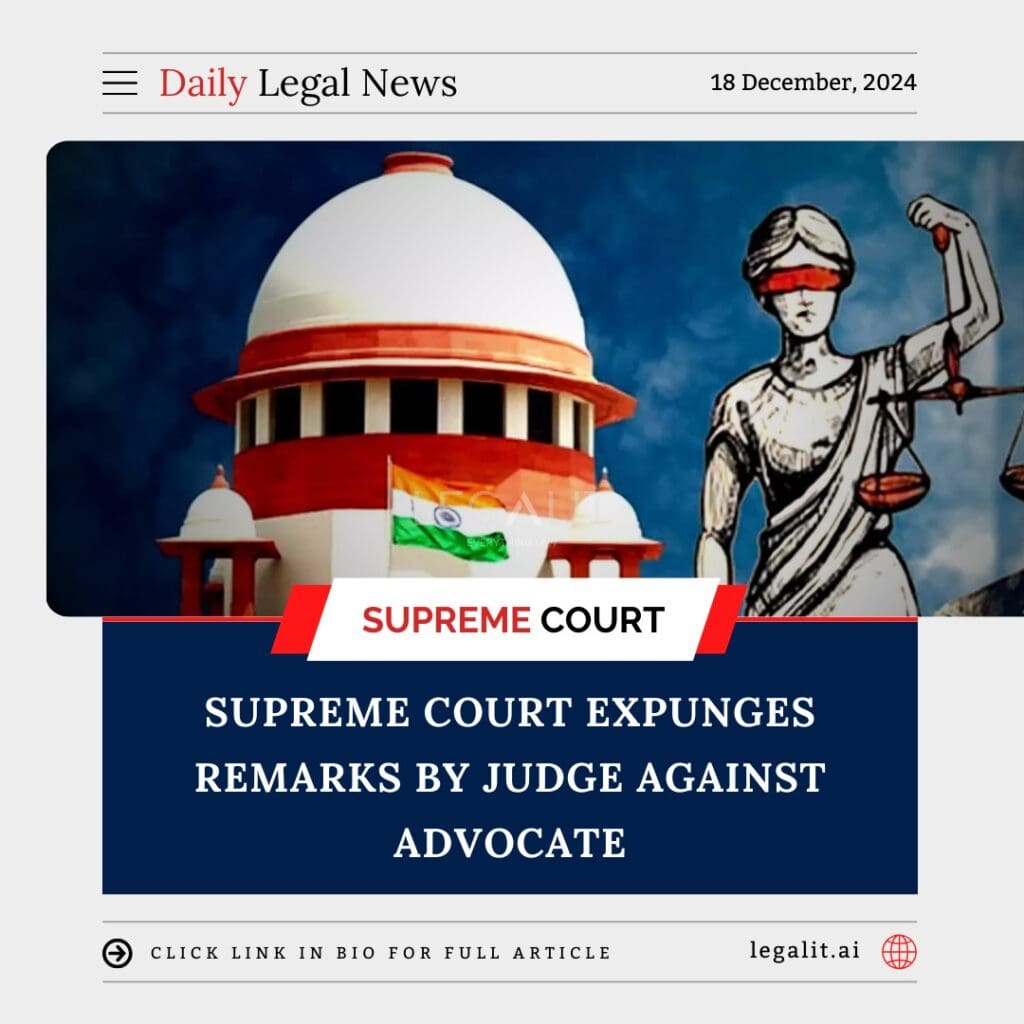
The Supreme Court of India has expunged derogatory remarks made by a judge against an advocate during a hearing. The decision followed a petition filed by the advocate challenging the remarks, which were perceived as disrespectful and damaging to the advocate’s reputation. The case has raised concerns about judicial conduct, the protection of advocates’ dignity, and the importance of maintaining decorum in court proceedings.
Background:
The matter arose from a hearing before a lower court in which the judge made certain remarks against the advocate. The comments were considered unprofessional by the advocate, who claimed that they were unfairly targeted and intended to undermine their credibility in the ongoing case. The advocate filed a petition before the Supreme Court, seeking the expunging of the remarks, arguing that they had caused personal and professional harm.
In response, the Supreme Court examined the matter and noted the importance of preserving the dignity and respect of all participants in the judicial process, including advocates. The court observed that such remarks could have a lasting impact on the advocate’s professional reputation and were not conducive to the proper functioning of the legal system.
Key Arguments:
- Advocate’s Stand:
- The advocate argued that the remarks made by the judge were unwarranted and defamatory, affecting their professional standing.
- They contended that the comments made by the judge did not have any basis in the facts of the case and were made in a manner that disrespected the legal profession.
- The advocate sought the expunging of the remarks to prevent any negative consequences in their future legal practice.
- Respondent’s Stand:
- The judge, in response, justified the remarks as being made in the course of the proceedings to address what they believed to be a lack of professionalism by the advocate during the hearing.
- The judge argued that the comments were not meant to cause harm but were necessary to maintain order in the courtroom.
- The judge also emphasized that their remarks were in line with the duty of the court to ensure decorum during proceedings.
Supreme Court’s Observations:
The Supreme Court, while addressing the matter, emphasized the need for judges to uphold the highest standards of conduct and fairness. It observed that judicial proceedings must be conducted in a manner that preserves the dignity of the legal profession and ensures that no individual is unjustly maligned.
The court noted that while judges have the authority to maintain discipline and order in court, this should not extend to making derogatory or unfair comments against advocates or other participants. The Supreme Court also reiterated that the relationship between the judiciary and the legal profession must be based on mutual respect and professionalism.
Legal and Policy Implications:
The expunging of the remarks by the Supreme Court underscores the importance of maintaining a balance between judicial authority and the rights of advocates to practice without fear of disparaging remarks or undue criticism. This case highlights the need for judicial conduct guidelines that ensure that all participants in legal proceedings are treated with respect and dignity.
The decision is likely to influence the way similar cases are handled in the future, particularly those involving allegations of judicial overreach or inappropriate conduct. It may also lead to increased awareness about the role of judges in maintaining the integrity of the legal process and safeguarding the rights of advocates.
Broader Context:
The case comes at a time when there is increasing focus on ensuring accountability and transparency in the judiciary. Advocates and legal professionals have long emphasized the need for a robust framework that prevents any form of judicial misconduct or bias. This case may serve as a reminder of the delicate balance between maintaining judicial independence and ensuring fair treatment for all parties involved in legal proceedings.
Conclusion:
The Supreme Court’s decision to expunge the remarks against the advocate reflects its commitment to upholding the integrity of the legal profession and ensuring that advocates are able to carry out their duties without fear of unwarranted disparagement. This ruling reinforces the need for a respectful and professional atmosphere within the courtroom and serves as an important reminder of the high standards expected of all members of the legal system.